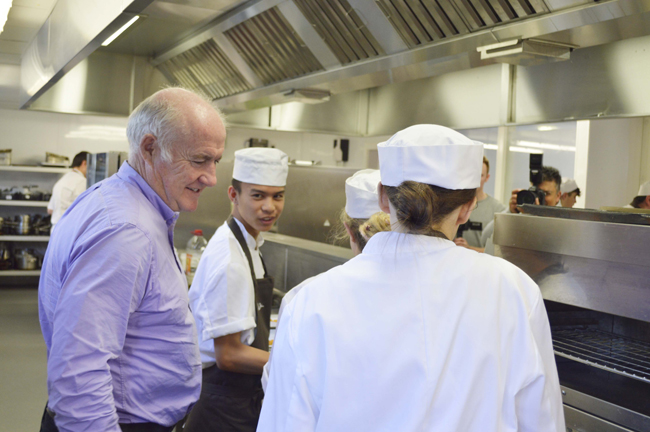Apprenticeships: is the system working for you?
The dramatic drop in apprenticeships since the introduction of the apprenticeship levy last April is fuelling calls for the government to make reforms. While some employers remain cynical, others are making the system work for them. Rosalind Mullen reports
It's no wonder that many employers are disgruntled with the new apprenticeship levy. The government said the system it launched last April (see panel) would help fund three million new apprenticeships by 2020. However, a decline in new starts since its introduction makes that unlikely. This is worrying at a time when many employers in the hospitality industry are worried about a skills deficit post-Brexit.
There are a number of issues deterring employers from creating apprenticeship posts. A common gripe from those who have to pay the levy (employers with a payroll of more than £3m contribute 0.5% to training) is that it is yet another tax and they may never get out as much as they pay in. Complaints from smaller companies range from the system being too complex to the fact that a fifth of an apprenticeâs training needs to be offsite.
The Chartered Institute of Personnel and Development, the Institute of Directors and the Confederation of British Industry (CBI) are among those bodies calling for reform. CBI managing director of people policy Neil Carberry described the latest figures as âalarmingâ, and says it âproves again that the apprenticeship levy isnât yet working for businesses, apprentices and the economyâ.
Hospitality operators have been voicing their concerns, including those who have set up successful apprenticeship schemes, such as Home Grown Hotels, the operator of the Pig collection of five properties (see panel overleaf). Alexa Bartlett-Woodnutt, group pastry development chef, who helps run the scheme, says there was little support when the levy was introduced: âWe are levy payers and we were wrongly informed how much our levy pot would be, as well as the cost of each qualification, so it was not a simple swap. There was a lot of talk in the build-up, but no one seemed to know what to do once it was up and running. It still needs some work.â
Matter of time
So while many in the hospitality industry believe the new system needs some serious tweaking, others recognise that the new trailblazer apprenticeships provide good-quality training and want to make the system work.
As for the drop-off, performance and talent management expert People 1st points out that levy-payers have 24 months to spend the funds and absorb the new rules. It acknowledges that there was a drop in apprenticeship starts from 33,100 in 2015/16 to 27,980 in 2016/17, but expects to see numbers pick up this year.
Director of strategic policy Annette Allmark says: âIf you take a close look at labour turnover, skills shortages, all-round productivity and the implication of Brexit on the hospitality industry, the levy actually provides a valuable opportunity to upskill existing employees, train and develop new talent and provide robust progression pathways that will help retain staff.
âAny new system takes time to integrate. Our experience is that employers are taking the appropriate time to plan their apprenticeship strategy to ensure it provides the return on investment they are looking for.â
Certainly, employers are facing a number of critical decisions as they plan their levy spend, such as selecting the right training provider and setting return on investment measures. What concerns many in an industry with so many small businesses is that the new system seems particularly onerous for SMEs. Businesses with 50-200 employees now have to release apprentices for one day a week for off-site training and contribute 10% of the training costs.
But Allmark stresses: âBy working with a good provider, their businesses will have the opportunity to train and retain staff, so the contribution is worth it. We know that some providers feel a drop in starts has resulted from smaller businesses being reluctant to pay for apprenticeship training, but the plan from April 2018 is for larger employers with excess levy to be able to transfer up to 10%, including to smaller businesses in their supply chain.â
Funds for the young
The fact that the government no longer fully funds apprenticeships for 16- to 18-year-olds has been heavily criticised, and the Association of Employment and Learning Providers (AELP) is lobbying for all 16- to 18-year-old apprentices to be fully funded by the government. It argues that the compulsory employer contribution is a disincentive for SMEs to hire a challenging apprentice, especially now that maths and English support is required.
âFor a government committed to improving social mobility, ministers have to be really concerned about the continued drop in starts for both young people and at lower levels,â says chief executive Mark Dawe.
Things were made worse in December when the government dropped 200 established training providers, many of which were small and trained at a local level. This reduced choice for employers in rural areas, which could affect training for disadvantaged and young people.
On a positive note, Jill Whittaker, managing director at HIT Training, which trains half of hospitality apprentices, says this industry is faring better than most. She is surprised by the increase in the number of younger apprentices, with 16- to 18-year-olds accounting for 40%, up from 20% of hospitality apprenticeships.
âIt surprises me that there are businesses out there who donât understand that an apprentice can be any age. This message is not getting across,â she says.
She adds that while apprenticeship starts in hospitality are down since the levy, it was ânot nearlyâ the 59% claimed by the initial government figures. But she concedes it has been tricky. âThis time last year, 85% of our apprenticeships were with SMEs, which is high. Today, the balance is 50:50, so we are moving in the direction of large employers training more apprentices.
âAll companies have struggled to understand the system. Previously, most apprenticeships were free to employers, so they have had to get their head around making a financial contribution â" the government expected that.â
As for affordability, Whittaker reasons that most apprentice bills come in at around £5,000, but as the employer contributes only 10%, that is reduced to £500 â" or £50 a month per apprentice if paid in instalments over 10 months.
âCompared with other business payments it seems like a bargain, but somehow everyone is focused on the negative and it has put people off,â says Whittaker. âFor £500 you can give an individual better skills and improve your business. For example, at some apprenticeship levels you can set your trainee a project. They come up with a solution, so you not only get a rounded individual, you have solved a problem in your business. People are looking at apprenticeships the wrong way round.
âApprenticeships are important and we are relying on them to drive the supply of skilled managers post-Brexit. There is a lot of noise around the levy, so we have lost the good things going on, such as the fact an individual can make something of their career through hard work, rather than leave university with debt.â
Certainly, companies such as Thai Leisure Group are using apprenticeships to develop managers and it has launched a Level 4 Hospitality Manager Apprenticeship. Similarly, Gordon Ramsay Groupâs (GRG) three-year scheme was created in partnership with the University of West London to provide certification up to NVQ Level 3 in professional cookery, pâtisserie and confectionery.
Former chief executive of GRG Stuart Gillies told The Caterer prior to his recent departure from the company: âYou can moan all day about the state of the industry â" the lack of talent, millennials and business rates â" just get on with it and find a solution or stop moaning about it.â Itâs clearly not a good sign if apprenticeship starts continue to fall, though the decline already seems to be tapering off. Arguably, if the industry wants to survive Brexit and the ongoing skills shortage, it needs to buy into the new apprenticeship scheme, which is designed to create transferable skills.
âFrom our discussion with employers, the system is starting to settle,â says Allmark.
How the apprenticeship levy works
Since April 2017, all UK employers with a pay bill of more than £3m per year pay the apprenticeship levy. The levy is set at 0.5% of the value of the employerâs pay bill minus an apprenticeship levy allowance of £15,000 per financial year. The funds generated by the levy have to be spent on apprenticeship training costs, so it is in the employerâs interest to use it. The government tops up the funds paid by the employer by 10%. You have up to two years to use your levy pot. If you do not claim it, other employers can access these funds to cover the training costs for apprentices within their organisation. Employers who do not pay the levy have to contribute to the cost of training â" generally about 10%, with the government contributing the remaining 90%.
Rick Stein Group: developing talent
The Rick Stein Group has recruited an annual cohort of up to 12 chefs each September since 2008, and the company was recognised in the governmentâs Top 100 Apprenticeship Employers in 2016.
The main focus is the chef apprenticeship programme, which is supported by the cookery school and the groupâs head chefs, who act as mentors, but other apprenticeships include a joiner in the maintenance team, retail and customer service trainees and supervisory/leadership training.
âWhile we are mindful of the recent news about the impact of the apprenticeship levy on participation, we havenât experienced any difficulties in this respect,â says head of HR Michael Rabone. âThe main factor that would influence uptake is the overall quantity of candidates seeking to start or develop their career in a culinary role.â
To prepare for the levy, the HR department worked with its main training partner, Truro & Penwith College, to understand what its responsibilities would be and to ensure it is delivering the most up-to-date standards.
Rabone says: âAs part of the new standards, there is a need for our apprentices to spend a bit more time taking part in guided learning than they have done in the past. However, there is continued support from our head chefs as we all agree that apprenticeships are definitely the best way for developing talented chefs that have aspirations to succeed and to grow their careers with us.
âNow we are set up, there is no significant impact for us as a business and, bearing in mind we have an established track record of investing in apprentices, our commitment remains the same.â
Foraging and beekeeping at the Pig
Apprenticeships are taken seriously at Home Grownâs five Pig hotels. Some 17 chef apprentices have just come through the two-year programme it launched in 2015, and it was the only hotel group to be shortlisted for the governmentâs National Apprenticeship Awards.
Chef-director James Golding and group pastry development and kitchen co-ordinator Alexa Bartlett-Woodnutt recruit apprentices by giving cookery demonstrations in local colleges, typically attracting nine applicants for every place.
As well as gaining access to the required NVQ training, apprentices work through Pig Experience modules unique to the group, such as foraging and bee-keeping, as well as kitchen skills. Candidates have a starting salary in line with that of a non-apprentice chef and are offered immediate employment in the group on completion.
As for the new standards, Bartlett-Woodnutt is impressed as they cover the whole hotel, not just the kitchen. â[We are] looking forward to the Level 4 chef qualification, but again, we have been waiting for eight months for the standards to be finalised, so itâs not ideal,â she adds.
The Pig hotels have not experienced a drop-off in apprenticeship applications, which is good news as all the hotels are in rural locations, but with Brexit on the horizon, recruitment is only getting tougher. âWe certainly have had fewer applications overall for other kitchen roles, so feel there is a need to develop young talent and do what we can to support the skills shortage,â says Bartlett-Woodnutt.
The Torridon: âWe can train somebody whom we might have lostâ
The five-AA-star Torridon resort in the Scottish Highlands is committed to developing apprentices, despite being a small business. In Novemberâs Scottish Apprenticeship Awards, its front of house apprentice Rosie Wilkins scooped two trophies â" Apprentice of the Year Level 2 and Scotlandâs Apprentice of the Year.
The 18-bedroom independent hotel and 12-bedroom inn created the Apprenticeship in Hospitality Scotland with partners such as Apex hotels and Gleneagles in 2014. The two- or three-year, live-in, paid apprenticeship is open to 17- to 24-year-olds and is underpinned by the Modern Apprenticeship Hospitality framework.
Rohaise Rose-Bristow, co-owner of the Torridon, is training three apprentices to work across all departments. The apprentices do stages in partner hotels and can stay with the Torridon on completion of the course.
Rose-Bristowâs issue with the new system is knowing where the money is going. âThe Scottish system seems to be different,â she says. âThe levy is put into one pot and businesses can apply for up to £10,000. Where is the money going if not back into the system? Itâs going into a black hole that nobody can access.â
She points out that some 60,000 jobs in Scotland are filled by non-UK workers, so after Brexit apprenticeships will be even more important. âThe government needs to make hospitality attractive. We need a new campaign â" like the army,â she adds.
Itâs this skills shortage that highlights the benefits to training apprentices. âWe can train somebody whom we might have lost. For example, Rosie started in housekeeping as a summer job. We offered her an apprenticeship, and so kept her for four years. These schemes are not onerous. We are a [remote] Highland hotel, they are advantageous for us.â
The HR Forum: your guide to making the most of the levy
Among the insight featured at this yearâs HR Forum, taking place at London Hilton on Park Lane on 24 April, we will explore what it takes to create a successful and engaging apprenticeship scheme. Our expert panel will also discuss whether becoming an approved training provider delivers additional return on investment and what to do when apprenticeships donât run as smoothly as planned.
Focusing on the theme of future talent, the fast-paced half day conference will also address the following:
- Redefining talent: how hospitality can look beyond traditional talent pools to develop their talent pipeline.
- Solving your recruiting headaches: can artificial intelligence be the answer?
- The technology revolution: the role of technology in the workplace.
- Plus: secrets from the Best Places to Work in Hospitality winners
Book your ticket now at www.thehrforum.com



















